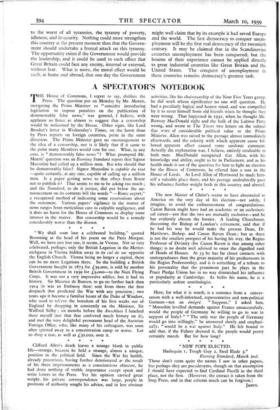Clifford Allen's death leaves a strange blank in public life—strange,
because he held a strange, almost a unique, position in the political field. Since the War his health, already precarious, having further deteriorated af the result of his three imprisonments as a conscientious objector, he had done nothing of visible importance except speak and write letters to the Press. Yet his opinion carried great weight, his private correspondence was large, people in positions of authority sought his advice, and in less obvious activities, like his chairmanship of the Next Five Years group, he did work whose significance no one will question. He had a peculiarly logical and honest mind, and was compelled by it to sever himself from old friends when he thought they were wrong. That happened in 1931, when he thought Mr. Ramsay MacDonald right and the bulk of the Labour Party wrong, and wrote to The Times two letters on the subject that were of considerable political value to the Prime Minister. Allen was raised to the peerage almost immediately afterwards, and the celerity with which apparent cause fol- lowed apparent effect caused some sardonic comment Actually the explanation was, I believe, entirely creditable to both men. MacDonald recognised that Allen, with his knowledge and ability, ought to be in Parliament, and as his health made it out of the question for him to fight an election for the House of Commons, he offered him a seat in the House of Lords. As Lord Allen of Hurtwood he made him- self a valuable place there, and his peerage undoubtedly gave his influence further weight both in this country and abroad.










































 Previous page
Previous page